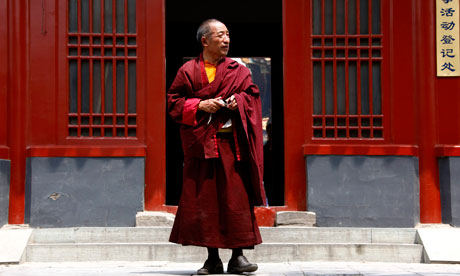China detains 300 Tibetan monks after self-immolation incident
Around 300 Tibetan monks from a Sichuan monastery have been detained by security staff after a monk set himself on fire

A Tibetan monk leaves a temple after praying on the 60th anniversary of what China calls the 'peaceful liberation' of Tibet, as a 're-education' crackdown intensifies with the arrest of 300 monks in Sichuan. Photograph: David Gray/Reuters
Security forces have detained about 300 Tibetan monks from a monastery in southwestern China for a month amid a crackdown sparked by a monk's self-immolation, according to two exiled Tibetans and a prominent writer, citing sources there.
Tension in Aba prefecture, a heavily ethnic Tibetan part of Sichuan province, have risen to their highest levels since protests turned violent in March 2008, ahead of the Beijing Olympics, and were put down by police and paramilitary units.
The monks from Aba's Kirti monastery, home to about 2,500 monks, were taken into custody on 21 April on military trucks, according to two exiled monks and a writer, who said their information was based on separate accounts from witnesses who live in Aba.
The detentions come as China's ruling Communist party celebrates 60 years since the "peaceful liberation" of Tibet, and underscores the government's struggle to win the hearts and minds of Tibetan people across the country.
Kirti Rinpoche, the head of the Kirti monastery, said that it was the first time that Chinese security forces had seized such a large number of monks at a time, and that he had no information on their whereabouts.
"The situation is getting more and more repressive," said Kirti Rinpoche, who is based in India's Dharamsala, the seat of the exiled Tibetan government, and receives his information through a network of contacts inside Aba.
"The restrictions imposed on the monastery and the monks are getting more intensified. It's literally a suffocating situation where monks are not allowed to do anything at all," he added.
His account could not be independently verified as the government restricts visits by foreign reporters to restive Tibetan regions.
Repeated calls to the Aba county government and public security bureau went unanswered. The Foreign Ministry said last month everything was "normal" at Kirti.
The spike in tension in Aba stems from the self-immolation of Phuntsog, a 21-year-old monk, on 16 March, in apparent protest against government controls.
Instead of putting out the flames, Chinese police beat the young monk, creating huge resentment in the monastery, according to exiled Tibetan spiritual leader the Dalai Lama.
The Aba government said in late April that after the burning incident, it had decided to give monks "legal education", due to the "illegal activities" committed by some monks that included visiting prostitutes, getting drunk, gambling and pornography, state news agency Xinhua news agency reported.
Chinese security forces clashed with residents who were trying to prevent the monks from being taken away for "re-education", according to Tibetan sources.
"The people didn't want the authorities to arrest the monks, so they started sitting outside the monastery to protect it day and night," said prominent Beijing-based Tibetan writer Woeser, who said her information was based on witness accounts.
"But the troops let out dogs to bite the people and after that, they beat them too."
Authorities have stepped up "patriotic re-education" campaigns at Kirti, in an effort to stamp out separatist sentiment and allegiance to the Dalai Lama.
"During the 'patriotic re-education' sessions, monks are taught reasons why they should not keep any pictures of their spiritual leader the Dalai Lama, and then made to repeat them," said an exiled Tibetan monk, Kanyag Tsering, who gets his information through a network of contacts inside Aba.
China routinely rejects any accusations about mistreatment or exploitation of Tibetans, saying its rule has bought untold benefits to what was a dirt poor and feudal society.
"The Dalai Lama group and some westerners see Tibet's peaceful liberation and development through tinted glass," Du Yongbin, a scholar at the China-Tibetology Research Centre in Beijing, said in a commentary in the China Daily on Monday.
"They either ignore the unprecedented development that Tibet has experienced or think Tibet's development threatens traditional Tibetan culture. Their logic seems to be to treat Tibet like a museum piece," he said.
(source:guardian.co.uk/world/2011/may/23/)
==============================================
No comments:
Post a Comment